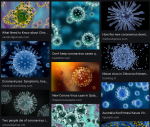Guiliang Tang's Profile

- Member for:
8 years 5 months - Institution:
Michigan Technological University - Website:
http://www.tech.mtu.edu/~gtang1/Tang_Website/Welcome.html
Biography
Dr. Tang conducted his graduate research on the catabolic pathway of the essential amino acid lysine in the laboratory of Dr. Gad Galili at the Weizmann Institute of Sciences, Israel. He then moved to the laboratory of Dr. Phillip D. Zamore at the University of Massachusetts Medical School for his post-doctoral research on plant RNA interference (RNAi) and microRNA (miRNA) pathways. He established his independent Gene Suppression Laboratory at the University of Kentucky (UK) and became a tenured Associate Professor there. In October 2011, he moved from UK to Michigan Technological University (MTU) at the Michigan’s Upper Peninsula (U. P.) for a family reunion and enjoyed the first winter time with much outdoor activities with his wife and kids. In May 2016, he became a full professor.
Guiliang's research projects
The Novel Acute Respiratory Syndrome RNA Coronavirus (COVID-19) is causing a huge world health problem. New approaches must be developed for a fast control of such virus. RNA interference (RNAi) was a Nobel winning discovery and is powerful in silencing all kinds of viral RNA. This project seeks to design and chemically synthesize a superior mix of siRNAs to silence this virus by a nasal spray.
Do you prefer larger, more flavorful blueberries? Our project is focused on identifying fruit microRNAs to improve the size and taste of blueberries. The yield of blueberries is related to their size, and while wild blueberries taste better than cultivars, their yield is much lower. We aim to find a way to combine the high yield of cultivars with the superior flavor of wild blueberries.
Many qualified undergraduate students are not sufficiently competitive in national applications to medical schools or graduate schools somewhat due to a lack of publication record in addition to research experience. This project will transform the current senior capstone experience courses BL4510/4530 into real practice for students to publish their first scientific papers in real journals.
Melvin Calvin was a well-known Michigan Tech alumnus and a Nobel laureate in Chemistry for his discovery of Calvin Cycle in photosynthesis. This proposal is to follow his scientific spirit by establishing a Calvin Research Program to support our students with a focus on photosynthetic biology-related researches.
STTM is an advanced technology to manipulate plant traits by modulating microRNAs in cells. The trainee will learn how to produce STTMs, introduce them into plants and observe their effects on plant development and productivities. Graduates learn the technology for researches, and new plant species and biotech product development. Undergraduates learn it for advanced studies & developing business.
用蓝莓对抗糖尿病和癌症:This project aims to improve the health of people, the education of Michigan Tech students, the research capability of Michigan Tech faculty, and the extension of growing better blueberries for the economical growth of the Upper Peninsula of Michigan. Our goal is to establish a blueberry experimental station and provide better, free, wild, and cultivar blueberry plants to local residents.
Projects that Guiliang has supported
Melvin Calvin was a well-known Michigan Tech alumnus and a Nobel laureate in Chemistry for his discovery of Calvin Cycle in photosynthesis. This proposal is to follow his scientific spirit by establishing a Calvin Research Program to support our students with a focus on photosynthetic biology-related researches.
Do you prefer larger, more flavorful blueberries? Our project is focused on identifying fruit microRNAs to improve the size and taste of blueberries. The yield of blueberries is related to their size, and while wild blueberries taste better than cultivars, their yield is much lower. We aim to find a way to combine the high yield of cultivars with the superior flavor of wild blueberries.
The Novel Acute Respiratory Syndrome RNA Coronavirus (COVID-19) is causing a huge world health problem. New approaches must be developed for a fast control of such virus. RNA interference (RNAi) was a Nobel winning discovery and is powerful in silencing all kinds of viral RNA. This project seeks to design and chemically synthesize a superior mix of siRNAs to silence this virus by a nasal spray.
Many qualified undergraduate students are not sufficiently competitive in national applications to medical schools or graduate schools somewhat due to a lack of publication record in addition to research experience. This project will transform the current senior capstone experience courses BL4510/4530 into real practice for students to publish their first scientific papers in real journals.
用蓝莓对抗糖尿病和癌症:This project aims to improve the health of people, the education of Michigan Tech students, the research capability of Michigan Tech faculty, and the extension of growing better blueberries for the economical growth of the Upper Peninsula of Michigan. Our goal is to establish a blueberry experimental station and provide better, free, wild, and cultivar blueberry plants to local residents.
用蓝莓对抗糖尿病和癌症:This project aims to improve the health of people, the education of Michigan Tech students, the research capability of Michigan Tech faculty, and the extension of growing better blueberries for the economical growth of the Upper Peninsula of Michigan. Our goal is to establish a blueberry experimental station and provide better, free, wild, and cultivar blueberry plants to local residents.
Do you prefer larger, more flavorful blueberries? Our project is focused on identifying fruit microRNAs to improve the size and taste of blueberries. The yield of blueberries is related to their size, and while wild blueberries taste better than cultivars, their yield is much lower. We aim to find a way to combine the high yield of cultivars with the superior flavor of wild blueberries.
Do you prefer larger, more flavorful blueberries? Our project is focused on identifying fruit microRNAs to improve the size and taste of blueberries. The yield of blueberries is related to their size, and while wild blueberries taste better than cultivars, their yield is much lower. We aim to find a way to combine the high yield of cultivars with the superior flavor of wild blueberries.
用蓝莓对抗糖尿病和癌症:This project aims to improve the health of people, the education of Michigan Tech students, the research capability of Michigan Tech faculty, and the extension of growing better blueberries for the economical growth of the Upper Peninsula of Michigan. Our goal is to establish a blueberry experimental station and provide better, free, wild, and cultivar blueberry plants to local residents.
Do you prefer larger, more flavorful blueberries? Our project is focused on identifying fruit microRNAs to improve the size and taste of blueberries. The yield of blueberries is related to their size, and while wild blueberries taste better than cultivars, their yield is much lower. We aim to find a way to combine the high yield of cultivars with the superior flavor of wild blueberries.
用蓝莓对抗糖尿病和癌症:This project aims to improve the health of people, the education of Michigan Tech students, the research capability of Michigan Tech faculty, and the extension of growing better blueberries for the economical growth of the Upper Peninsula of Michigan. Our goal is to establish a blueberry experimental station and provide better, free, wild, and cultivar blueberry plants to local residents.






 Gifts to projects listed on SUPERIORIDEAS.ORG are received and processed by Michigan Tech Fund. Michigan Tech Fund is a tax-exempt organization under Section 501(c)(3) of the Internal Revenue Code acting on behalf of Michigan Technological University. It is the policy of Michigan Tech Fund that a portion of the gifts and/or income therefrom may be used to defray the costs of raising and administering the funds.
Gifts to projects listed on SUPERIORIDEAS.ORG are received and processed by Michigan Tech Fund. Michigan Tech Fund is a tax-exempt organization under Section 501(c)(3) of the Internal Revenue Code acting on behalf of Michigan Technological University. It is the policy of Michigan Tech Fund that a portion of the gifts and/or income therefrom may be used to defray the costs of raising and administering the funds.